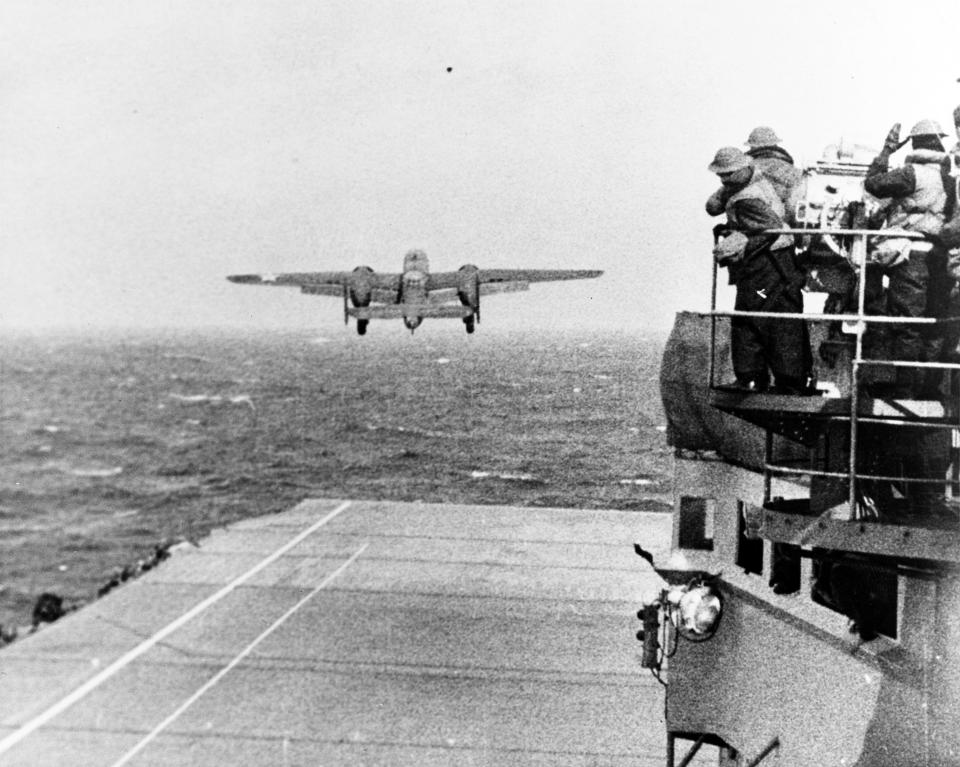Remembering a West Warwick airman’s heroics in the Doolittle Raid | Opinion
- Oops!Something went wrong.Please try again later.
Alan E. Mesches is the author of "The Flying Grunt, the Story of Lieutenant General Richard E. Carey United States Marine Corps, (Ret.)" and "Major General James A. Ulio, How the Adjutant General of the U.S. Army Enabled Allied Victory."
On April 18, let’s remember the Doolittle Raiders’ attack on Japan on that day in 1942. West Warwick’s Omer A. Duquette served as a gunner on crew 12. Duquette was the lone Rhode Island native to serve with the Doolittle Raiders. Then a staff sergeant, Duquette was in his fourth year of military service when Lt. Col. James H. “Jimmy” Doolittle’s Raiders selected him for the mission.
In February 1942, Sergeant Duquette was one of 140 volunteers who answered Colonel Doolittle’s call for airmen to participate in a "secret and dangerous" mission. Intense training took place at Fort Jackson, South Carolina and Eglin Air Field, Florida. Doolittle chose Duquette and 78 others for the assignment.
Duquette and the rest of the Raiders did not find out about their mission until just prior to boarding the USS Hornet in California. Doolittle announced to his 16 5-man B-25 crews that they would be bombing Japan. Weather conditions in the Pacific forced the airmen to launch farther out from Japan than planned. Each Raider knew that they would not have enough fuel to return to the Hornet.
More: Medal mystery: Cranston soldier's WWII heroism earned military's highest honor – twice
Crew 12 took off about 48 minutes after Colonel Doolittle’s B-25 flew from the Hornet. Duquette’s crew bombed a refinery, two factories, and a warehouse along the dock at Yokohama. Low on fuel, the five crew members bailed out over China where local citizens helped rescue them. Duquette broke a foot when he landed on the ground.
Following the attack on Japan, Duquette was reassigned to the China-Burma-India Theater. Six weeks later, Duquette died on June 3, 1942, when his aircraft hit a mountain after bombing Lashio, Burma while returning back to China. He was 26. His remains have never been recovered.

On Sept. 29, 1943, a remembrance stone in Duquette’s honor was placed in Phenix Square in West Warwick. Then-Brigadier General Doolittle attended the ceremony. Duquette’s awards and decorations included the Distinguished Flying Cross (DFC) and the Purple Heart. He earned the DFC for his actions during the bombardment of Japan. Duquette’s citation reads:
“For extraordinary achievement while participating in a highly destructive raid on the Japanese mainland on April 18, 1942. Sergeant Duquette volunteered for this mission knowing full well that the chances of survival were extremely remote, and executed his part in it with great skill and daring.”
More: Alphonso Gibbs Sr.'s journey from sharecropper to Korean War hero
Born in West Warwick in 1916, Duquette graduated from Notre Dame du Bon Conseil School. He joined the Army Air Force in 1938 in Providence. Prior to training for the Raiders, Duquette served at Fort Slocum, New York, Albrook Field at the Panama Canal Zone, and at Pendleton, Oregon.
We cannot forget the significance of the attack on Japan. The bombing of Japan by Duquette and his fellow Raiders jolted the enemy’s military. The Tokyo raid began America’s comeback from Pearl Harbor. Throughout 1942, America’s military ramped up its force and manufacturers switched from making consumer goods to building armaments for war. On April 18, let’s remember the heroism of the Doolittle Raiders. More importantly, let’s teach young students the story of a West Warwick native and his brave fellow airmen who achieved the first major American success story of World War II.
This article originally appeared on The Providence Journal: Sergeant Omer Duquette was one of 140 volunteers who answered the call for airmen to participate in a "secret and dangerous" mission.

